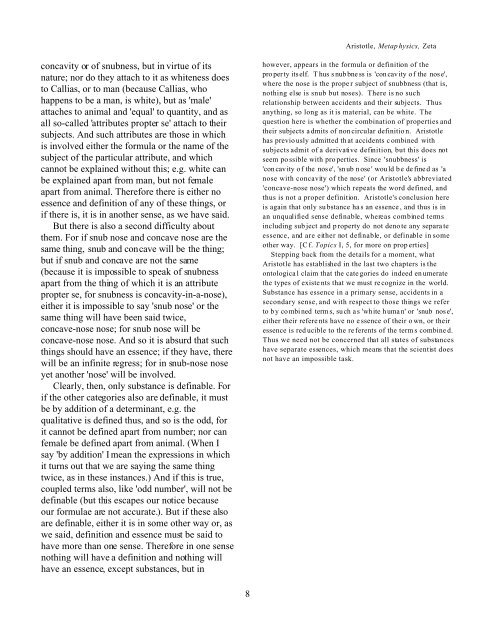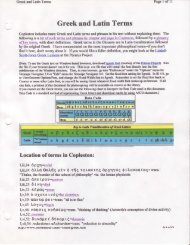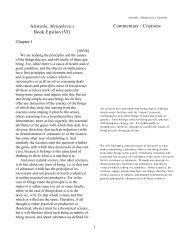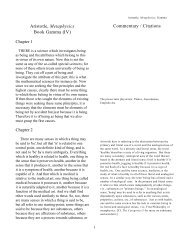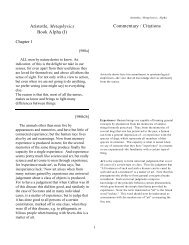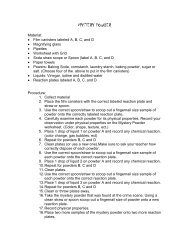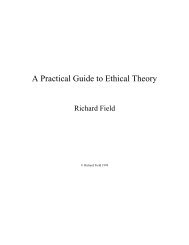Aristotle, Metaphysics Book Zeta (VII) Commentary ... - CATpages
Aristotle, Metaphysics Book Zeta (VII) Commentary ... - CATpages
Aristotle, Metaphysics Book Zeta (VII) Commentary ... - CATpages
You also want an ePaper? Increase the reach of your titles
YUMPU automatically turns print PDFs into web optimized ePapers that Google loves.
<strong>Aristotle</strong>, <strong>Metaphysics</strong>, <strong>Zeta</strong><br />
concavity or of snubness, but in virtue of its<br />
nature; nor do they attach to it as whiteness does<br />
to Callias, or to man (because Callias, who<br />
happens to be a man, is white), but as 'male'<br />
attaches to animal and 'equal' to quantity, and as<br />
all so-called 'attributes propter se' attach to their<br />
subjects. And such attributes are those in which<br />
is involved either the formula or the name of the<br />
subject of the particular attribute, and which<br />
cannot be explained without this; e.g. white can<br />
be explained apart from man, but not female<br />
apart from animal. Therefore there is either no<br />
essence and definition of any of these things, or<br />
if there is, it is in another sense, as we have said.<br />
But there is also a second difficulty about<br />
them. For if snub nose and concave nose are the<br />
same thing, snub and concave will be the thing;<br />
but if snub and concave are not the same<br />
(because it is impossible to speak of snubness<br />
apart from the thing of which it is an attribute<br />
propter se, for snubness is concavity-in-a-nose),<br />
either it is impossible to say 'snub nose' or the<br />
same thing will have been said twice,<br />
concave-nose nose; for snub nose will be<br />
concave-nose nose. And so it is absurd that such<br />
things should have an essence; if they have, there<br />
will be an infinite regress; for in snub-nose nose<br />
yet another 'nose' will be involved.<br />
Clearly, then, only substance is definable. For<br />
if the other categories also are definable, it must<br />
be by addition of a determinant, e.g. the<br />
qualitative is defined thus, and so is the odd, for<br />
it cannot be defined apart from number; nor can<br />
female be defined apart from animal. (When I<br />
say 'by addition' I mean the expressions in which<br />
it turns out that we are saying the same thing<br />
twice, as in these instances.) And if this is true,<br />
coupled terms also, like 'odd number', will not be<br />
definable (but this escapes our notice because<br />
our formulae are not accurate.). But if these also<br />
are definable, either it is in some other way or, as<br />
we said, definition and essence must be said to<br />
have more than one sense. Therefore in one sense<br />
nothing will have a definition and nothing will<br />
have an essence, except substances, but in<br />
however, appears in the formula or definition of the<br />
pro per ty itself. T hus s nub bne ss is 'con cav ity of the nose',<br />
where the nose is the proper subject of snubbness (that is,<br />
nothing else is snub but noses). There is no such<br />
relationship between accidents and their subjects. Thus<br />
anything, so long as it is material, can be white. The<br />
question here is whether the combination of properties and<br />
their subjects admits of noncircular definition. <strong>Aristotle</strong><br />
has previously admitted that accidents combined with<br />
subjects admit of a derivative definition, but this does not<br />
seem possible with properties. Since 'snubbness' is<br />
'con cav ity of the nose', 'sn ub n ose ' wou ld b e de fined as 'a<br />
nose with concavity of the nose' (or <strong>Aristotle</strong>'s abbreviated<br />
'concave-nose nose') which repeats the word defined, and<br />
thus is not a proper definition. <strong>Aristotle</strong>'s conclusion here<br />
is again that only substance has an essence, and thus is in<br />
an unqualified sense definable, whereas combined terms<br />
including subject and property do not denote any separate<br />
essence, and are either not definable, or definable in some<br />
other way. [Cf. Topics I, 5, for more on prop erties]<br />
Stepping back from the details for a moment, what<br />
<strong>Aristotle</strong> has established in the last two chapters is the<br />
ontological claim that the categories do indeed enumerate<br />
the types of existents that we must recognize in the world.<br />
Substance has essence in a primary sense, accidents in a<br />
secondary sense, and with respect to those things we refer<br />
to b y combi ned term s, such as 'white huma n' or 'snub nose',<br />
either their referents have no essence of their o wn, or their<br />
essence is red ucible to the referents of the term s combined.<br />
Thus we need not be concerned that all states of substances<br />
have separate essences, which means that the scientist does<br />
not have an impossible task.<br />
8


